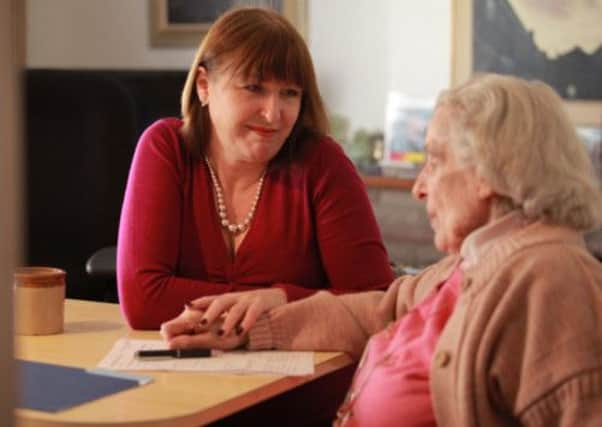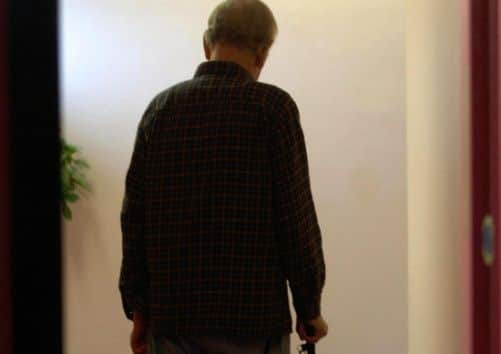A tower of strength in darkest times for families in the shadow of dementia


Alice is a determined woman. She has repeated, “We will not let it beat us,” so often that it has become her mantra. However, the adversary is dementia, and she knows that it will win eventually. Until it does though, she and her husband, Ralph, need all the help they can get.
Ralph was diagnosed with dementia six years ago. His family first noticed something was wrong when his memory started to fail and normal conversation occasionally proved difficult. Initially they hoped it was nothing more than a few “senior moments” but when at a family wedding relatives took Alice aside and asked what was wrong with Ralph they knew it wasn’t something which could be so easily dismissed.
Advertisement
Hide AdAdvertisement
Hide AdReferred by his GP for an MRI scan, when the results came back Ralph was diagnosed with Alzheimer’s. Then, as is the usual procedure, the couple were referred to their local memory clinic. Ralph was assessed, given follow-up appointments, but in the meantime he and Alice got on with coping on their own.


“I didn’t want us to be treated differently,” says Alice. At first it wasn’t too bad. Even now, Ralph can follow conversations, although not always, and sometimes his sentences trail off into nothing. Alice, a retired primary school teacher keeps them both busy and the internet has proved invaluable in learning about the disease.
However, Google can’t answer everything. Today’s question is: dare they go to a funeral when Ralph’s medication has given him dreadful diarrhoea? This would be a concern to anyone, but Ralph has lost the ability to give warning that he needs the toilet. While she wants them both to live as normal a life as possible, she doesn’t know whether to risk driving for hours in someone else’s car.
So Alice asks Matthew Burns, who is sitting on the sofa in their warm and comfortable house in Huddersfield. Matthew is an Admiral Nurse and for Alice and Ralph, a god send. Just as Macmillan Nurses offer support to cancer sufferers and their families, Admiral Nurses do the same for those affected by dementia.
Advertisement
Hide AdAdvertisement
Hide AdThey provide a vital service and for those who have watched their loved one silenced or made violent by dementia the presence of an Admiral Nurse can be a life line.
I know this because my family has lived through it. My stepfather John died of dementia two years ago, following four increasingly hellish years. My mother, an education executive and former school headteacher, spent countless hours on the phone trying to understand what services were available to them.
It was frustrating, stressful and time-consuming, because there was nothing linking any of those services together. We had been assigned a nurse from the memory clinic who visited the family home, but his caseload was in the hundreds and his time was always in short supply.
The burden of care fell on my mother, already exhausted because my dad woke up distressed nearly every night. Soon his disease caused him to react to her with fury, hatred and violence. After years of putting on a brave, stoical face, my calm, strong mother considered driving them both off a bridge, until she remembered reading about an Admiral Nurses helpline. The person on the other end of the phone, she says now, saved her life.
Advertisement
Hide AdAdvertisement
Hide AdAdmiral Nurses began as a pilot project in Westminster in 1990. They were named in memory of Joseph Levy, known as “Admiral Joe” for his love of sailing, who died of vascular dementia, and are run by Dementia UK.
As well as the helpline, the nationwide charity, also works to get Admiral Nurses into as many homes as it can. But it is difficult. Once my mother put the phone down, she was on her own again, because there are only 102 Admiral Nurses nationwide to cope with the estimated 800,000 people living with dementia. In Yorkshire there are just eight, and none were based in south Wakefield where my parents lived.
So Alice and Ralph are lucky to live in Kirklees, which has a team of three to cope with a population of 4,000 people living and struggling with dementia. Each nurse has about 25 people whose cases are on-going, and more who are referred to as “holding” cases – they are coping OK on their own for now, but may not in a few weeks or months time.
Matthew worked as a mental health nurse in hospital before applying to be an Admiral Nurse.
Advertisement
Hide AdAdvertisement
Hide AdHe loves it, and it is clear that he is deeply appreciated. He knows exactly what help and support is available from both state and private sources and the best way to access it. He can advise on medication, a vital resource when dementia medication is so often a case of trial and error.
Crucially, he is also available for home visits and on the other end of a phone to answer questions whenever they crop up. Essentially he is there to navigate families through what mental health professionals call the “care journey”, which is often long and always fraught with pitfalls.
Matthew doesn’t pretend to be able to solve every problem, but he is there as a sounding board and to help people like Alice and Ralph from becoming prisoners in their own homes.
“I don’t want it creating a mental barrier and keeping us in,” she says. Research shows socialising is important when you live with dementia, but friends do sometimes fall by the wayside and outside help can be key.
Advertisement
Hide AdAdvertisement
Hide AdIt was when Alice fell ill with a virus that she became depressed and began to cope less well. Her daughter – both her children live away – told her she needed help and having remembered reading a newspaper story about Admiral Nurses she got in contact with the charity. Now she says she’s not sure how she’d cope without Matthew’s presence.
“He is so reassuring. I know I can always get hold of him. Sometimes he comes in the nick of time.”
Over in Mirfield, another Admiral Nurse is helping another family. Michelle McGowan has been coming to visit Mary for a couple of years now and has watched as her husband, Roger has deteriorated.
He is out at day care in Dewsbury, but it is clear that Mary is finding things harder. Roger no longer concentrates on TV programmes. He doesn’t read and his wife has felt the brunt of his frustration.
Advertisement
Hide AdAdvertisement
Hide Ad“He’s been really very nasty,” says Mary. Like a lot of carers she is reluctant to go into detail and part of Michelle’s job – Admiral Nurses sometimes describe their job as detective work – is to find out just how bad the situation is so they can offer the right help.
Mary’s husband is a big man, and it’s hard for her to manoeuvre him into the shower or toilet, and Michelle’s request to social services has come to nothing, so she will follow it up. Mary is worried about newspaper stories about people getting fined for misusing their benefits and happens to mention that because of Roger’s illness they can’t go on holiday.
Michelle suggests something called Dementia Adventure, which arranges holidays for people living with dementia, and Car Companions, a new scheme where volunteers can drive people to appointments and stay with them. She will look into both and Mary seems relieved, because she doesn’t get out as much as she’d like.
Admiral Nurses are skilled at wading through red tape and every family whose life has been touched with dementia should have one.
Advertisement
Hide AdAdvertisement
Hide AdAlice says her only aim is to keep her beloved husband “clean, smart, well-fed and as happy as he can be under the circumstances”.
Matthew helps her do that, by dispensing advice, putting her in direct contact with other services, but mainly by being a consistent and reliable source of support whenever they need him.
“He knows what I can do to make things better for both of us,” she says. “I didn’t train for this.”
A campaign to raise money to fund more Admiral Nurses in Yorkshire is now underway. To book tickets for A Night to Remember, a dinner-dance at the Queens Hotel in Leeds on March 9 go to http://night-to-remember.org.uk. Proceeds from the event will go towards a new Admiral Nurses post in Wakefield.
Counting the cost of ageing
Advertisement
Hide AdAdvertisement
Hide AdAbout one in 10 carers in the UK are currently caring for a person with dementia and this is figure is increasing every week.
Two out of three people living with dementia in the UK are cared for at home
Each year 163,000 new cases occur in England and Wales each year – one every three minutes
Dementia effects 820,000 people in the UK and with an ageing population that figure is only going to increase.
As well as the huge personal cost, dementia costs the UK economy £23bn a year. This is more then cancer and heart disease combined.